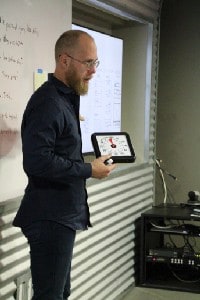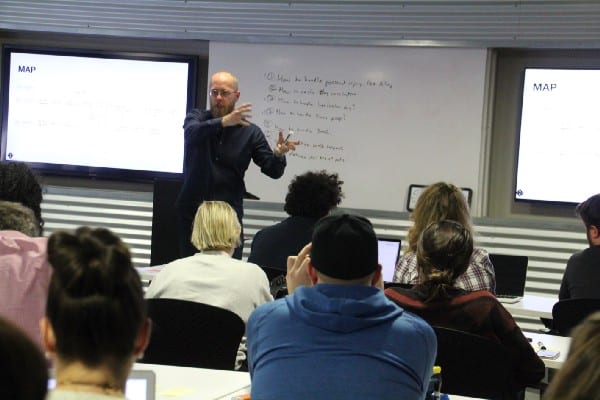
Last week was not only Austin City Limits Music Festival but also Startup Week here in Austin. Barton Springs was full of festival equipment, the roads active with out-of-town festival guests and Capital Factory was a buzz of activity from all sorts of events. It also happened to be the week of our monthly Design Sprint meetup and in honor of Startup Week, I decided to host a 2-hour Design Sprint Essentials Workshop in addition to our regularly scheduled programming with JC Glancy sharing the Zen Business sprint story.
I was pleased that the workshop was standing room only and the audience was highly engaged with lots of questions. One of the attendees asked me the question “What makes a good facilitator? What should I consider when selecting a facilitator?”. As a Sprint facilitator, I was excited to answer this question and decided to capture my thoughts here in a Medium story.





Objective
An effective facilitator provides a pair of fresh eyes as they are impartial and unbiased. For this reason, I always recommend using an external facilitator to guarantee that they are truly neutral and open-minded. This unprejudiced perspective will ensure that they will allow the process to guide outcomes rather than pushing their own agenda.
Organized
Your facilitator is responsible for keeping you on track, always knowing what’s next, and capturing every detail in your sprint. If your facilitator has poor organizational skills, then you risk your Sprint going off the topic, losing focus, or running out of time to properly conduct each exercise. Lack of adequate organization and attention to detail can also result in a poorly documented Sprint. Capturing critical moments and decisions in the Sprint ensures that you have access to all the Sprint assets for reference after the Sprint and for use in future Sprints.

Compassionate
The ideal facilitator is friendly and understanding. A successful Sprint requires a sympathetic and understanding environment and the facilitator’s job is to foster these conditions. The Sprint team is engaged in difficult and critical work which has the potential of drastically reshaping the future of the business. An empathetic and solicitous facilitator is the linchpin of healthy debate and positive progress.
Assertive
A facilitator must also be assertive and not a submissive pushover or you won’t make real progress. Instead, you need someone who will exercise good judgement and know when to lean in and when to back off. They are confident and decisive when it matters. If you need to a make a quick decision, they quickly command the room and direct the decider to make a decision so you can move on. With an excellent facilitator, this happens while still imbuing a sense of calm and empathy.

Business Experience
Business experience will allow your facilitator to nudge and steer you away from potential pitfalls and push you to move on quickly when the conversation has derailed and has little business merit. If the facilitator also has technical or logistics experience, they can also bridge conversations between business and logistical concerns.
Product Experience
Facilitators with product experience are able to draw from their experiences designing and building products to offer more analogous inspiration which will help to further unlock the creativity of the team. This comes in handy if the team needs pointers around scope and technical viability during solution sketching or prototyping.
I often find that my product experience benefits my facilitation when deciding on a rumble versus an MVP and guiding the generation of the storyboard.

Design Experience
Unless you are prototyping a physical experience or hardware, you’ll need skilled visual designers who are master pixel manipulators to produce one or more prototypes. However, when I suggest that your facilitator have design experience, I’m speaking of solutions design or service design. While this individual could have experience moving pixels the goal is to look for deep experience solving hard problems and designing systems. During the sprint, your focus is on solutions that solve your problem and the right facilitator will have the experience to guide you there.
Research Experience
Teams without a dedicated UX researcher or someone skilled at conducting interviews often rely on me to run the interviews on Friday. If you know you’ll need help with the interviews on Friday, make sure you consider this when selecting your facilitator. It is critical that they have experience recruiting and interviewing in the 5 Act Interview format. While the Day 5 interviews resemble other moderated interview styles, there are some unique characteristics that make them special. Spend the time and ensure you have someone experienced in this type of interviewing or you risk tainted or suboptimal results.
Sprint Experience
Your first Sprint is always a huge learning experience. It is best to have a facilitator who knows the process well and can keep you focused on the task so you don’t have to worry if you are properly following the process. I wasn’t completely comfortable facilitating Sprint until I worked closely with Jake and the rest of the Google Ventures Design team. Look for someone who has run many Sprints and has mastered the nuance of the process.
FREE DOWNLOAD
Get Our Design Sprint Planner
Everything you need to ace your Design Sprint.
Facilitation Experience
After getting bit by the facilitation bug, I’ve gotten interested in other co-creation and ideation frameworks. This research has not only helped me enhance my custom workshop offering, it has also bolstered my facilitation skills overall. My toolkit is ever-growing and my current favorite is Liberating Structures. If you can’t find a facilitator who has studied other practices and techniques consider someone who has prior experience managing complex projects, presentations, or running scrums and other large meetings.
Hopefully, I’ve provided a bit more perspective on the various qualities to look for in a facilitator. Your facilitator may not have all of the traits and experience above, however, I hope that you are now better equipped to assess if a facilitator will help you get the most out of your Sprint.
I’m looking forward to running the Design Sprint Essentials workshop once a quarter as long as there is interest and new people looking to learn the mechanics of a Design Sprint. If you weren’t able to come out, perhaps you can join me in a future workshop.



